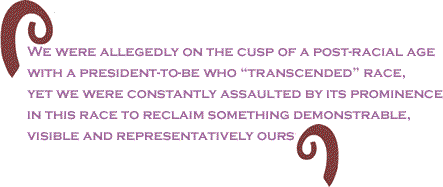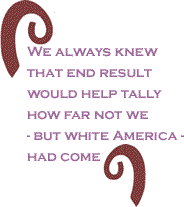
|
|||||||||||||||||||||||
From the Fringe By K. Danielle Edwards BlackCommentator.com Columnist |
|

Custom Search
|
|
 |
|
“Tool up.” “They’re buying racks and racks of ammunition. There were spots where there was none left.” “You better have a security plan in place.” These were not words uttered in a frontier dialect from the lips of NRA members. Instead, they were the voices of friends and family. Their voices and phrases sounded in my ears and played in my mind like a catchy poetic refrain that wouldn’t go away or a bad song that got stuck in the memory bank from airwave excess. It was like a scratched album that halted the dance floor in a freeze frame of twisted hips, raised arms and feet mid-stomp. This was no party, but the conspiratorially minded and purveyors of caution were figuratively “pooping” on the one going on in my mind.
This was our kitchen table issue. While a black (by all historical American definitions and applications of race) man stood to be the first viable Presidential nominee, my people were cautiously optimistic - voting with one eye over their shoulder, putting campaign signs in their yard with restraint and daring to don Obama logos on their cars, regularly taking an inventory of their vehicles for paint scratches or other signs of retaliatory vandalism. We were allegedly on the cusp of a post-racial age with a president-to-be who “transcended” race, yet we were constantly assaulted by its prominence in this race to reclaim something demonstrable, visible and representatively ours. We were now nearly a decade into the 21st century but were chained to a past that rewound all the way back to the 16th century. We were consciously clued in to the shackles, the Black Codes, the failures of Reconstruction, the hits and misses of the Civil Rights era and the missteps, landmines and missed opportunities in the intervening decades. Many of us had “moved on up” and gotten a sliver of a piece of pie, yet remembrances of Jim Crow, that time we were passed up for that promotion, that look our neighbors gave us when we moved into the neighborhood, and that time we spoke to a white coworker at the grocery store and they acted as if they didn’t see us, resonated with a post-traumatic relevance that gave the multi-generational response to black mistreatment and misery new legitimacy. On election eve, some of us
camped out in front of the television or tuned into the radio all
day. Others took Election Day off from work, spending hours in prayer,
reflection and meditation. Some took the day after off, in order
to debrief personally and prepare for what the next four years could
bring in I awoke on November 4 feeling unsteady. The morning began as if I had woken from an anesthesia-induced sleep. I wavered on my feet; my hands shook; my eyes viewed my surroundings as through a changing and unpredictable kaleidoscope of mirages. The world looked holographic to me. I am the child of parents who came of age during the 1960s. I am the granddaughter of those who had firsthand acquaintance with sharecropping and remembrances of relatives who themselves had been condemned to lifelong servility and uncompensated labor. I live about 30 miles from where my paternal ancestors fixed meals and farmed fields on hallowed land - where a major university, forgotten graves, antebellum homes with secrets and cookie-cutter subdivisions now stand.
The election didn’t mean that the curtain on racism would close, that its centuries of performance would have no more encores. It didn’t signal that affirmative action is no longer a concern. It didn’t cure AIDS, eliminate health disparities or reduce economic incongruities. It didn’t erase the facts or phantoms of slavery. It didn’t make the multitudes of black men become devoted and involved fathers, nor did it inspire them to finally marry their baby’s momma. The election didn’t do any of this. Not yet. From the time Obama crossed
the line from being some guy from Obama offers a new template,
a counter to the rapper, the athlete, the ex-con, the corner vagabond
- images that dominate pop culture, visuals that we have too often
give a pass. Obama shows black boys and girls - young men and young
women - that thug love is a denial and dead, that a man and a woman
can be married, successful and happy beyond TV Land and The Huxtables.
One young black man interviewed by CNN said it simply, that Obama makes him “want to do better.” If this moment becomes a movement that makes multitudes of others do the same, that will be more than enough for me. Click
here
to post a comment about the election BlackCommentator.com
Columnist, K. Danielle Edwards, a Nashville-based writer, poet and communications
professional, seeks to make the world a better place, one decision
and one action at a time. To her, parenting is a protest against
the odds, and marriage is a living mantra for forward movement.
Her work has appeared in Blue Jean Magazine, Mother
Verse Literary Journal, Mamazine.com, Mamaphonic.com, Parenting
Express, The Black World Today, Africana.com,
The Black World Today, The Tennessean
and other publications. Work from Edwards is forthcoming
in Black Magnolias Literary Journal. She is the author of Stacey Jones: Memoirs of Girl & Woman, Body &
Spirit, Life & Death |
|
Any BlackCommentator.com article may be re-printed so long as it is re-printed in its entirety and full credit given to the author and www.BlackCommentator.com. If the re-print is on the Internet we additionally request a link back to the original piece on our Website. Your comments are always welcome. eMail re-print notice
If you send us an eMail message we may publish all or part of it, unless you tell us it is not for publication. You may also request that we withhold your name. Thank you very much for your readership. |
|
| |
|
| November 7, 2008 Issue 298 - Election Issue |
| Executive Editor: Bill Fletcher, Jr. |
| Managing Editor: Nancy Littlefield |
| Publisher: Peter Gamble |
| Est. April 5, 2002 |
Printer Friendly Version
in resizeable plain
text format or pdf
format. |
| Frequently Asked Questions |
 |

|
 |
 |
 |
| |
| |





























 This
was the lead-up to the 2008 Presidential election. In a time when
we were giving each other virtual high-fives via e-mail for witnessing
history in the making, we were also arming ourselves, psychically
and physically, with trepidation and tactics that embodied just
how far we, perhaps, had really not come as a nation. We were frenetic
and afraid; we sipped on the soup of our checked ambivalence at
meal time.
This
was the lead-up to the 2008 Presidential election. In a time when
we were giving each other virtual high-fives via e-mail for witnessing
history in the making, we were also arming ourselves, psychically
and physically, with trepidation and tactics that embodied just
how far we, perhaps, had really not come as a nation. We were frenetic
and afraid; we sipped on the soup of our checked ambivalence at
meal time.
 The
path to progress is not always a straight line; it often intertwines.
And this is why we laugh, hold our breath and cry; our emotions
are a grove of feelings, like vines and creepers that envelop us
when we least expect it. This is why black
The
path to progress is not always a straight line; it often intertwines.
And this is why we laugh, hold our breath and cry; our emotions
are a grove of feelings, like vines and creepers that envelop us
when we least expect it. This is why black 





